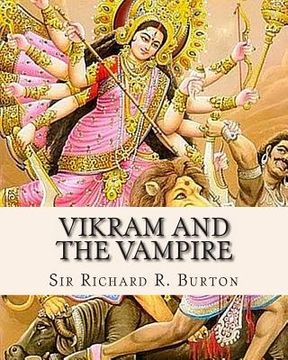Vikram and The Vampire: Classic Hindu Tales of Adventure, Magic, and Romance (en Inglés)
Reseña del libro "Vikram and The Vampire: Classic Hindu Tales of Adventure, Magic, and Romance (en Inglés)"
PREFACE TO THE FIRST (1870) EDITION. "THE genius of Eastern nations," says an established and respectable authority, "was, from the earliest times, much turned towards invention and the love of fiction. The Indians, the Persians, and the Arabians, were all famous for their fables. Amongst the ancient Greeks we hear of the Ionian and Milesian tales, but they have now perished, and, from every account we hear of them, appear to have been loose and indelicate." Similarly, the classical dictionaries define "Milesiae fabulae" to be "licentious themes," "stories of an amatory or mirthful nature," or "ludicrous and indecent plays." M. Deriege seems indeed to confound them with the "Moeurs du Temps" illustrated with artistic gouaches, when he says, "une de ces fables milesiennes, rehaussees de peintures, que la corruption romaine recherchait alors avec une folle ardeur." My friend, Mr. Richard Charnock, F.A.S.L., more correctly defines Milesian fables to have been originally " certain tales or novels, composed by Aristides of Miletus "; gay in matter and graceful in manner. "They were translated into Latin by the historian Sisenna, the friend of Atticus, and they had a great success at Rome. Plutarch, in his life of Crassus, tells us that after the defeat of Carhes (Carrhae?) some Milesiacs were found in the baggage of the Roman prisoners. The Greek text; and the Latin translation have long been lost. The only surviving fable is the tale of Cupid and Psyche, [1] which Apuleius calls 'Milesius sermo, ' and it makes us deeply regret the disappearance of the others." Besides this there are the remains of Apollodorus and Conon, and a few traces to be found in Pausanias, Athenaeus, and the scholiasts. I do not, therefore, agree with Blair, with the dictionaries, or with M. Deriege. Miletus, the great maritime city of Asiatic Ionia, was of old the meeting-place of the East and the West. Here the Phoenician trader from the Baltic would meet the Hindu wandering to Intra, from Extra, Gangem; and the Hyperborean would step on shore side by side with the Nubian and the Aethiop. Here was produced and published for the use of the then civilized world, the genuine Oriental apologue, myth and tale combined, which, by amusing narrative and romantic adventure, insinuates a lesson in morals or in humanity, of which we often in our days must fail to perceive the drift. The book of Apuleius, before quoted, is subject to as many discoveries of recondite meaning as is Rabelais. As regards the licentiousness of the Milesian fables, this sign of semi-civilization is still inherent in most Eastern books of the description which we call "light literature," and the ancestral tale-teller never collects a larger purse of coppers than when he relates the worst of his "aurei." But this looseness, resulting from the separation of the sexes, is accidental, not necessary. The following collection will show that it can be dispensed with, and that there is such a thing as camparative purity in Hindu literature. The author, indeed, almost always takes the trouble to marry his hero and his heroine, and if he cannot find a priest, he generally adopts an exceedingly left-hand and Caledonian but legal rite called "gandharbavivaha.

